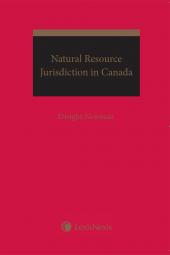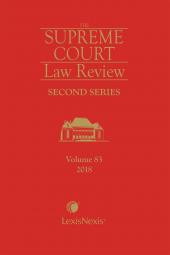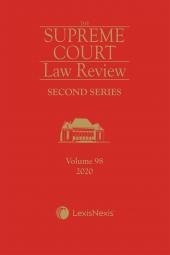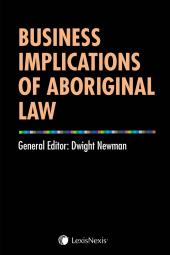Natural Resource Jurisdiction in Canada
One Year Subscription Only Terms
Subscribers receive the product(s) listed on the Order Form and any Updates made available during the annual subscription period. Shipping and handling fees are not included in the annual price.
Subscribers are advised of the number of Updates that were made to the particular publication the prior year. The number of Updates may vary due to developments in the law and other publishing issues, but subscribers may use this as a rough estimate of future shipments. Subscribers may call Customer Support at 800-833-9844 for additional information.
Subscribers may cancel this subscription by: calling Customer Support at 800-833-9844; emailing customer.support@lexisnexis.com; or returning the invoice marked 'CANCEL'.
If subscribers cancel within 30 days after the product is ordered or received and return the product at their expense, then they will receive a full credit of the price for the annual subscription.
If subscribers cancel between 31 and 60 days after the invoice date and return the product at their expense, then they will receive a 5/6th credit of the price for the annual subscription. No credit will be given for cancellations more than 60 days after the invoice date. To receive any credit, subscriber must return all product(s) shipped during the year at their expense within the applicable cancellation period listed above.
Détails des produits
The issues surrounding jurisdiction over Canadian natural resources are becoming increasingly wide-ranging – as well as increasingly complex – making this book an especially timely publication. Authored by constitutional and Aboriginal law expert, Dwight Newman, Natural Resource Jurisdiction in Canada explores this evolving area of jurisprudence from a variety of perspectives, including constitutional, Aboriginal, commercial and environmental..
Highlights of This Book
This resource is the first of its kind to be published in Canada and offers ground-breaking analysis of the disputes and litigation related to jurisdiction over Canadian natural resources.
It can be difficult to make sense of this intricate topic, mostly because there are often many competing interests involved in trying to determine jurisdiction over natural resources in Canada. Dr. Newman cuts through the confusion and, applying his extensive knowledge and experience, synthesizes the pertinent foundational constitutional principles and applies them to the divisions of constitutional jurisdictions – whether proprietary-based, power-based, tax-based or rights-based – across the natural resources spectrum. As a result, practitioners gain insight into the conflicting priorities and are better able to deal with them in their day-to-day legal practice..
Natural Resource Jurisdiction in Canada is accessible, yet thorough, and covers the major categories of Canadian natural resources, with entire chapters dedicated to:
- Mining and minerals
- Energy (oil, gas, pipelines, coal, nuclear)
- Forestry, agriculture and bioresources
- Water and fisheries
Who Should Read This Book
Natural Resource Jurisdiction in Canada is the perfect reference for those who are interested in constitutional law or Aboriginal law principles as they relate to natural resources, but don't want to have to sift through a general treatise on constitutional or Aboriginal law for the relevant information. This book will also be particularly useful to:
- Natural resources practitioners
- In-house counsel at natural resources firms
- Aboriginal law practitioners
- Competition and foreign investment practitioners
- Constitutional lawyers
- Law libraries
Table des matières
Chapter 1: Introduction
1. Natural Resource Jurisdiction Conflicts
2. Basic Concepts of Canadian Division of Powers Between Federal and Provincial Governments
3. Overview of Constitutional Sections Affecting Natural Resources
4. Devolution of Jurisdiction to the Northern Territories
5. Aboriginal Property, Aboriginal Jurisdiction and the Duty to Consult
Chapter 2: Divided Jurisdiction over Natural Resources
1. Introduction
2. Natural Resources in the Federal State
3. Competing Typologies of Jurisdictional Argument on Natural Resources in Canada
4. Coordination of Jurisdiction on Foreign Investment in Natural Resource Contexts
5. Coordination of Environmental Impact Assessment
Chapter 3: Mining and Minerals
1. Introduction
2. Offshore Resources
3. Onshore Minerals and Mining
Chapter 4: Energy
1. Introduction
2. Coal and Carbon Capture Issues
3. Oil and Gas
4. Pipelines
5. Application of Pipelines Jurisprudence to Electrical Transmission
6. Uranium and Nuclear Power
Chapter 5: Forestry, Agriculture and Bioresources
1. Forestry
2. Agriculture
3. Aquaculture
4. Wildlife
5. Other Bioresources
Chapter 6: Water and Fisheries
1. Introduction
2. Federal Maritime Jurisdiction
3. Provincial Powers Over Water Management
4. Federal Fisheries Power
5. Aboriginal Water and Fishing Rights
6. Jurisdictional Conflicts Over Water Pollution
Chapter 7: Conclusions and Future Challenges
 Lexis Nexis
Lexis Nexis 


